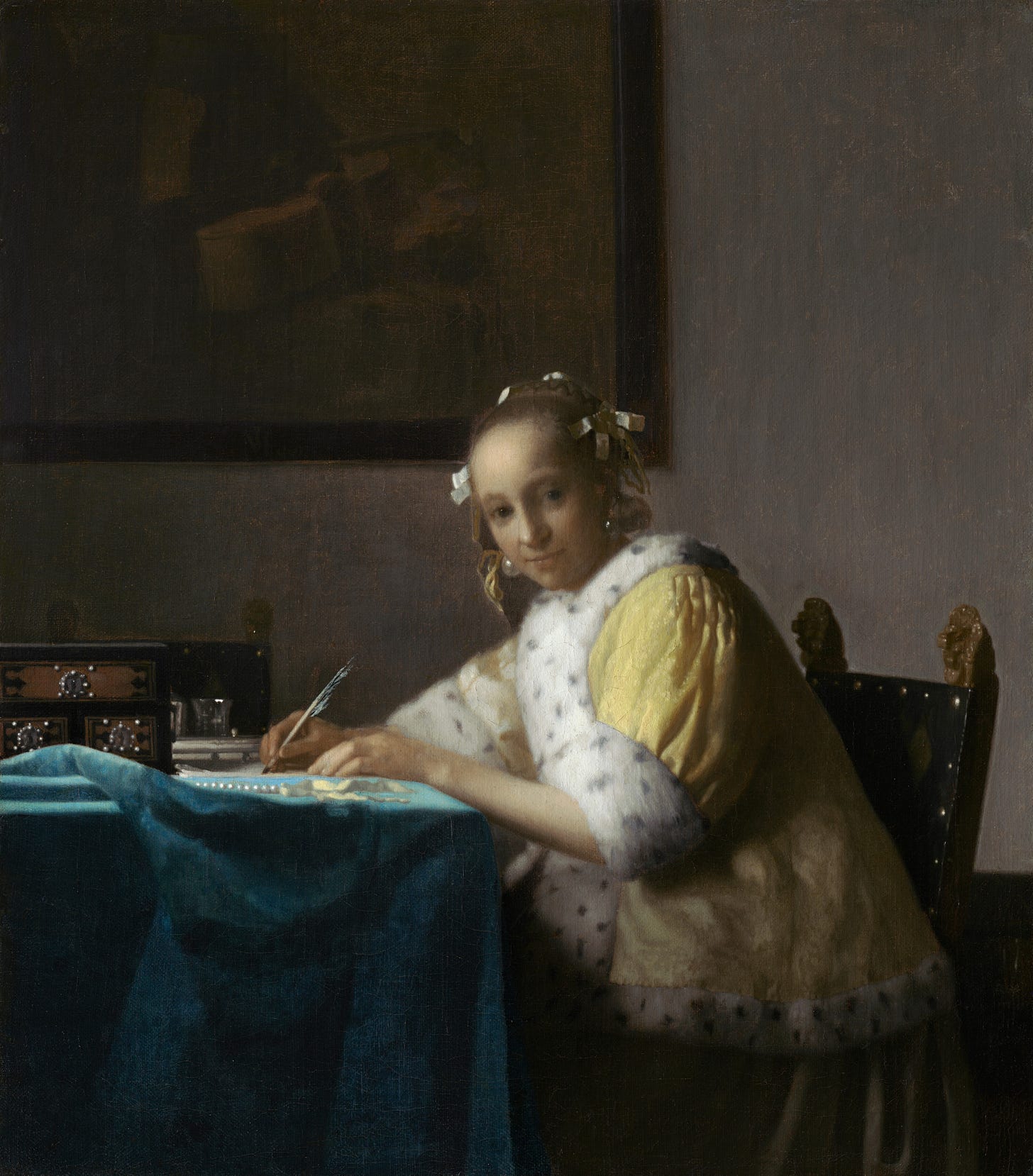Coming soon: Dear Scribbler
A write-in advice column about the art, craft, job, and life of writing.
This Friday, free to subscribers of Write Whatever the Hell You Want, I’m launching “Dear Scribbler,” a write-in advice column about the art, craft, job, and life of writing.
It's not that I'm such an expert. But I must have a nice-person face, because so many people have emailed me for advice about writing-related stuff over the past seven years—friends, family, students, readers, long-lost acquaintances, random people who found me on the internet—that I honestly can’t count them all.
I pretty much always write a few thousand words back. I enjoy it, and I feel like it’s important to pass on anything I can. A lot of people have given me stellar advice over the years, supported and encouraged me when they absolutely did not have to, especially early in my career. I don’t think they worried all that much about whether their advice was perfect; it didn’t have to be perfect to be useful. I’m just really, really glad they gave it to me.*
Image: “Holy Allegory,” Giovanni Bellini, 1490-1500 ca. I really love this painting, which I got to see in the Uffizi this spring. It reminds me of all the different needs we have as humans at different times of our lives, the way we constantly diverge and intersect.
But as any compulsive advice-giver knows, it can take a toll. There are those rare bad experiences, where you spend hours crafting a thoughtful response and get nothing back, not even a reply; others where the person responds by asking for more and more and more until you’re exhausted. As my own career got further in the weeds—child, pandemic, random life stuff, and ordinary early-career learning curve—my bandwidth shrank and my confidence waned. I worried that giving away so much time and energy was hurting my own work, and wondered how much my advice would be worth if I had no career left.
My therapist encouraged me to say “no”; the internet told me to standardize my responses to common questions, cutting and pasting as needed; colleagues told me to put consultant rates on my website. This is all excellent and sensible advice, and particularly important for women to hear, I think. I suspect women (and marginalized writers of all stripes) get asked for advice a lot more than their male counterparts, and say yes twice as often. The idea that our time and expertise are valuable and should be valued by others is well worth internalizing.
So I set about internalizing it. Saying “no” helped at first; I learned a lot about my boundaries that way. But it also wound up making me feel isolated, joyless, and cut off from my community. I had more time to write, but less inspiration; my productivity didn’t go up appreciably, and now I felt even worse about it, because there was “no excuse.” Standardizing my advice was an utter failure. I wound up tailoring my boilerplate so completely every time that I might as well have rewritten it from scratch. The problem was that although a lot of people asked the same questions, their circumstances were all completely different. One-size-fits-all didn’t seem like a good use of my time or theirs.
When all else failed, I started charging. I’d saved it for last because it felt both terrifying and embarrassing. I wanted to be a mentor, a helper, a good friend, not a consultant; but I had to admit that I’m not any of those things when I’m burned out and secretly resentful. Finally, after getting some coaching myself and seeing how worthwhile it was to pay someone for support and guidance, I took a deep breath, fought through the imposter syndrome, and put rates up on my website. I did not anticipate how tremendously freeing this would feel. It’s hard to explain why. Even if it was only me valuing my own expertise, it was better than no one valuing it. When I got clients, my confidence grew. Suddenly, it seemed silly that I was waiting around to be handed the chance to teach a university or college course, or even shopping it around to the many worthy local organizations that offer affordable classes to the community. I’d enjoyed teaching for these orgs, and still do; but I wanted to teach this one exactly the way I wanted. I got clients, students, positive feedback. It turned out people really did value my time and expertise.
Best of all, it immediately helped my writing—I mean instantly. In many ways, it was the missing ingredient in my writing life. Giving advice forces me to listen closely to others, examine my own beliefs, and articulate them with care. And, unexpectedly but gloriously, it makes me want to write. And write. And write.
The thing is, obviously, that not everybody can afford coaching, classes, and consulting. I haven’t always been able to afford it myself. And, as I’m sure many have experienced, the times I needed it most were when I could least afford it.
Image: “A Lady Writing,” Johannes Vermeer, c. 1665. There aren’t that many pictures of people smiling while they write. I bet wearing an ermine-trimmed coat helps.
Here’s where Captain Awkward, my favorite online advice columnist and one I’ve been reading for nigh on a decade, comes into it. A few years ago, after Bad Habits was published, she reached out to ask if I’d give guest advice to a letter-writer who’d been severely traumatized by her academic program. The experience as wonderful. I didn’t know it, but I’d been dying to be asked.
What if I went back to writing those tailored 3,000-word responses, but this time I wrote them for a wider audience? What if more than one person could see them? Even if my advice wasn’t perfect, surely it would help someone. The Captain, as is her wont, gave me some very generous pointers on how to begin. And so, here we are.
I chose “Dear Scribbler” chiefly for its resonance with that "damned mob of scribbling women" Hawthorne famously decried in 1855. I like the idea of being part of a damned mob—and, as an author who got her start as part of an oft-maligned tidal wave of post-Gone Girl thrillers, I kind of already am! Plus, The Scribbler sounds like a Batman villain, which is in itself inspirational. Most of all, it accords with my very best piece of writing advice, summed up in the title of this Substack. When you write whatever the hell you want, any little scribble on a napkin is something you might wind up falling in love with. That, in my opinion, is as close to a perfect writing life as it gets.
Ninety percent of advice is projection, and I’m sure mine will be as biased and flawed as anyone else’s. But I promise I will always try to be as transparent as possible about where I’m coming from, what experiences color my worldview, and where I’m weakest, and I won’t hesitate to call in experts when I’m out of my depth.
So feel free to write dearscribbler@gmail.com with your questions, problems, and complicated feelings about any aspect of the writing life—jealousy! querying! productivity! blocks! what to get your agent for the holidays!—and the Scribbler will do her best.
*Thanks, Dan Solomon, Mary Helen Specht, Mike Graupmann, Jessica Hopper, Kimberly Jones, Laura Lippman, and a million other people!





